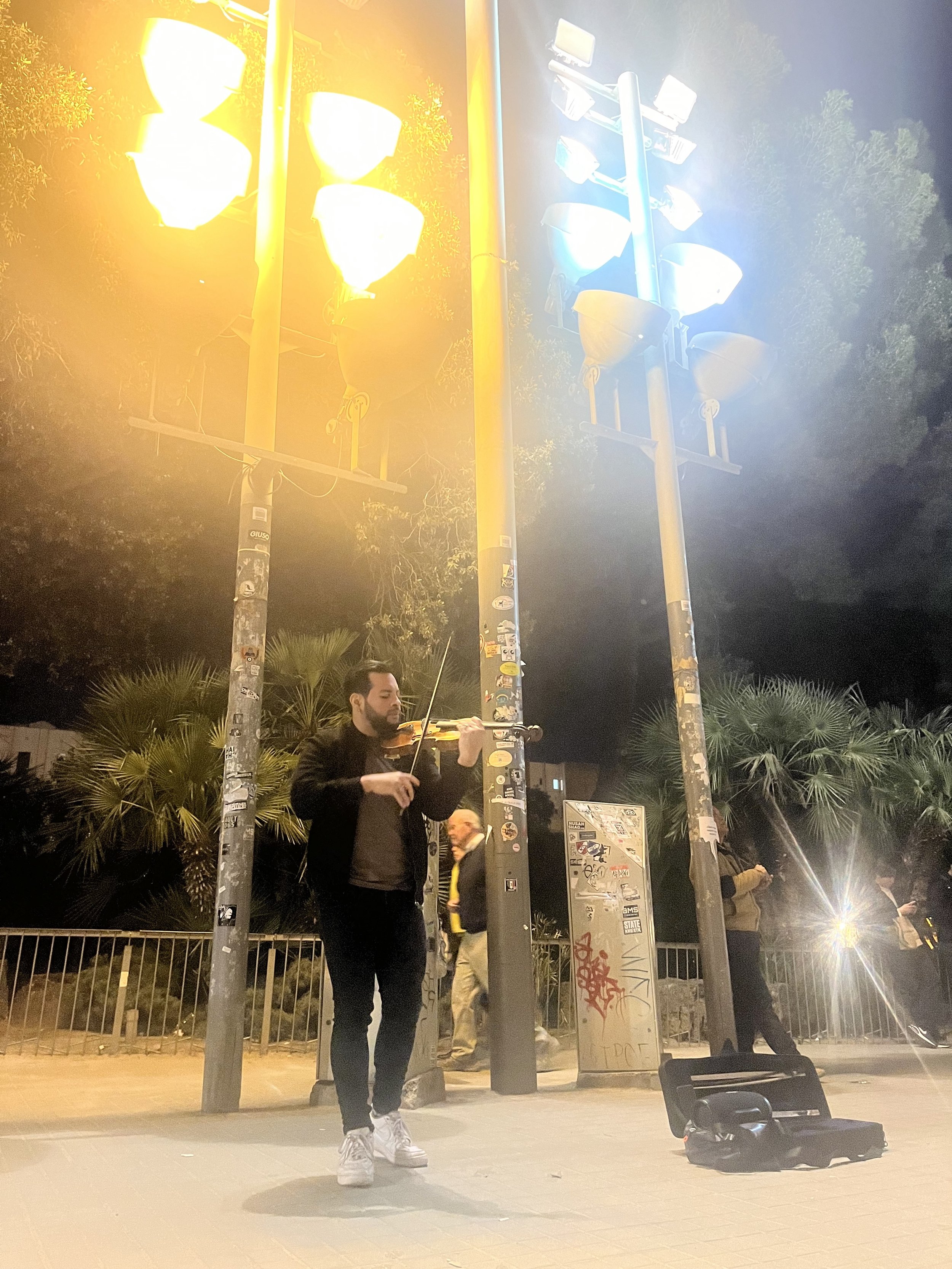
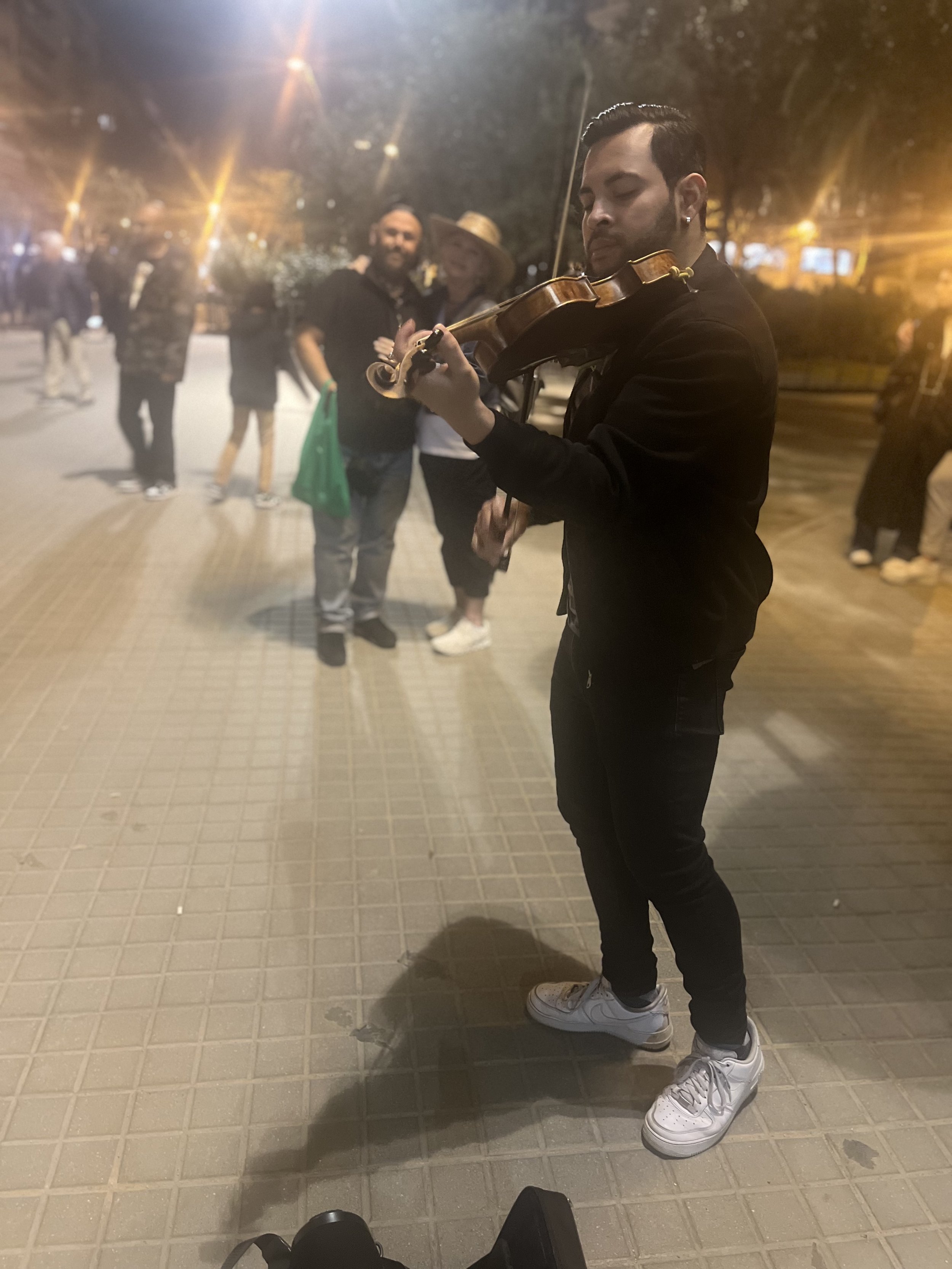
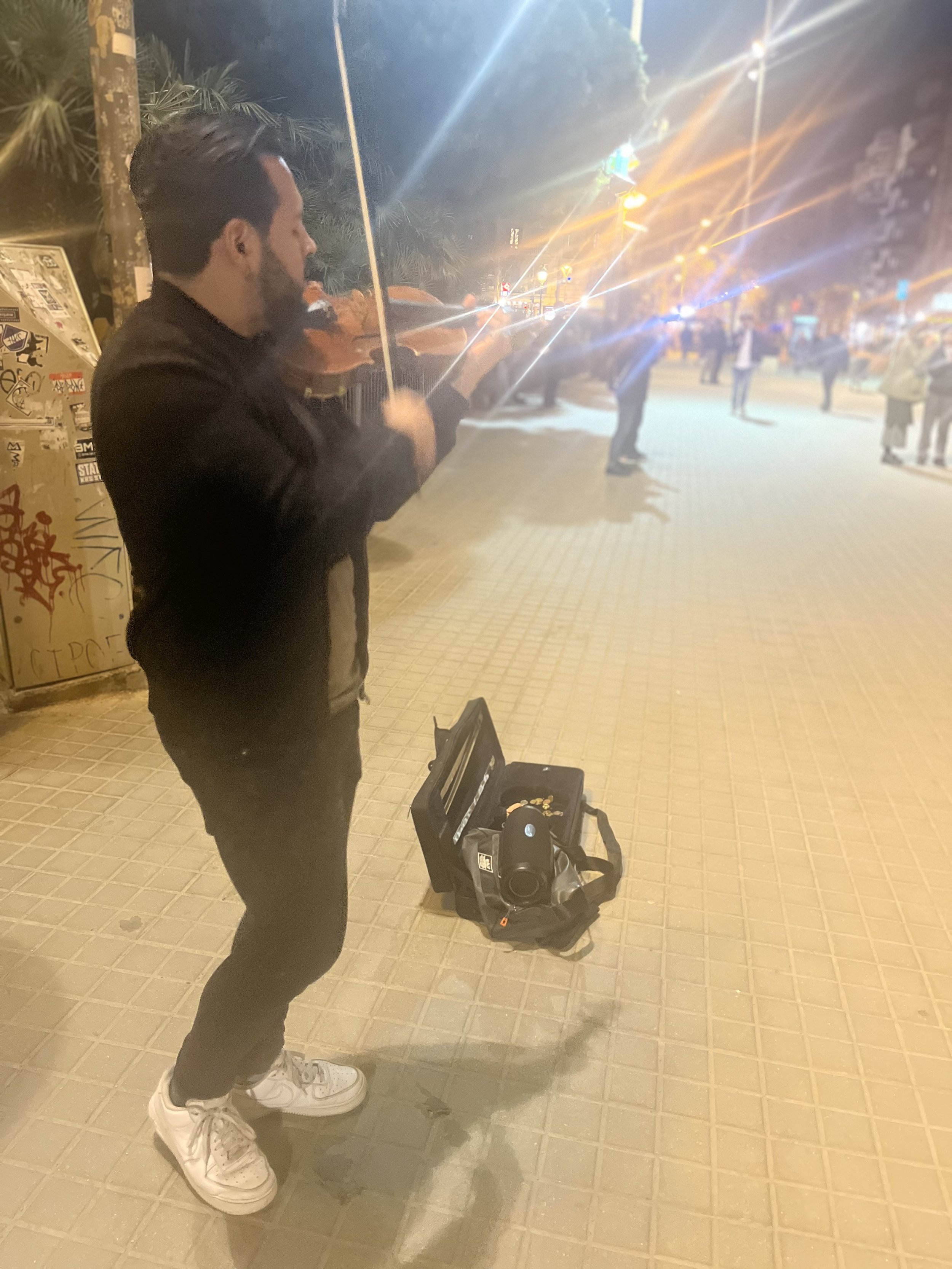


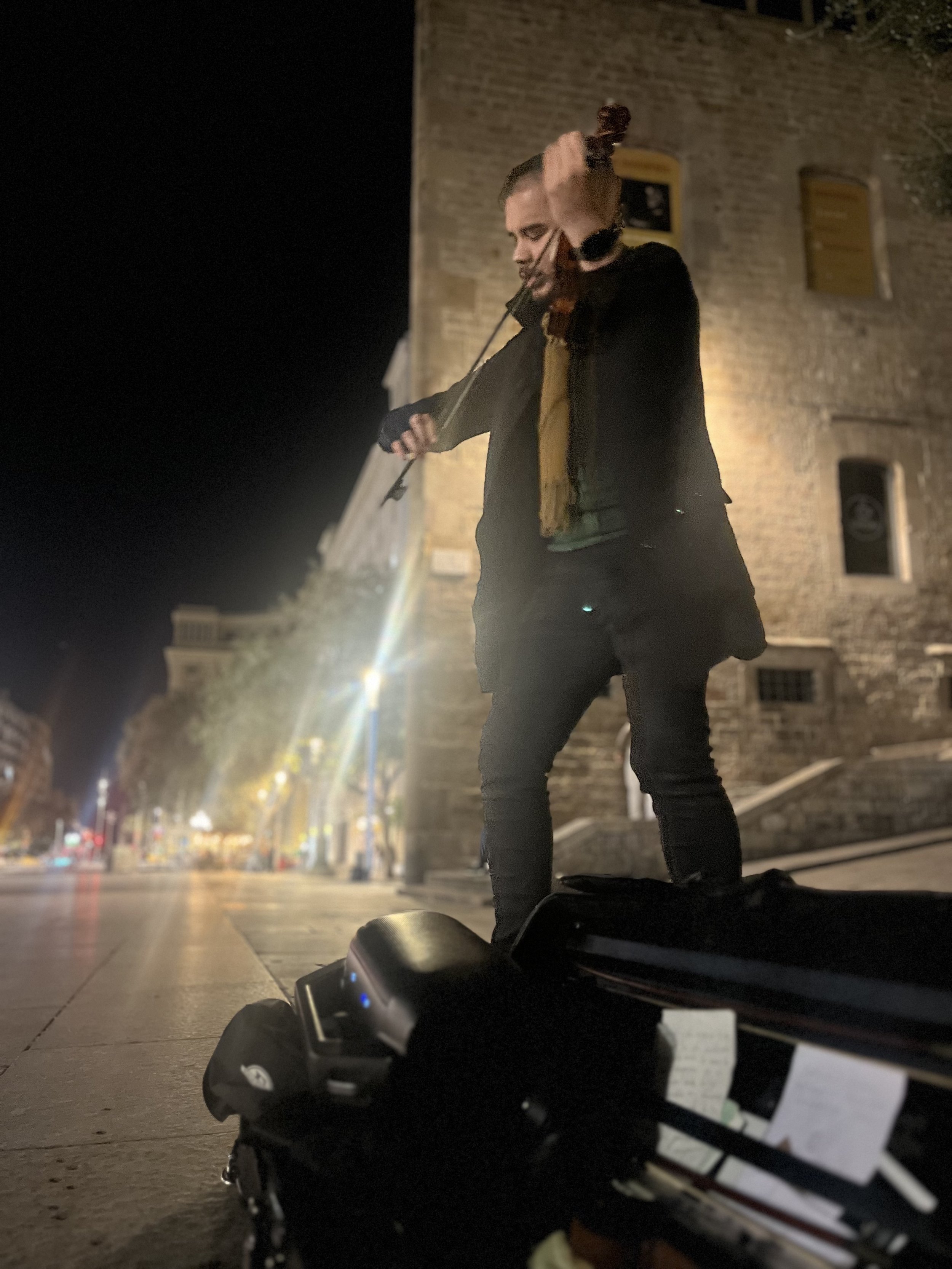

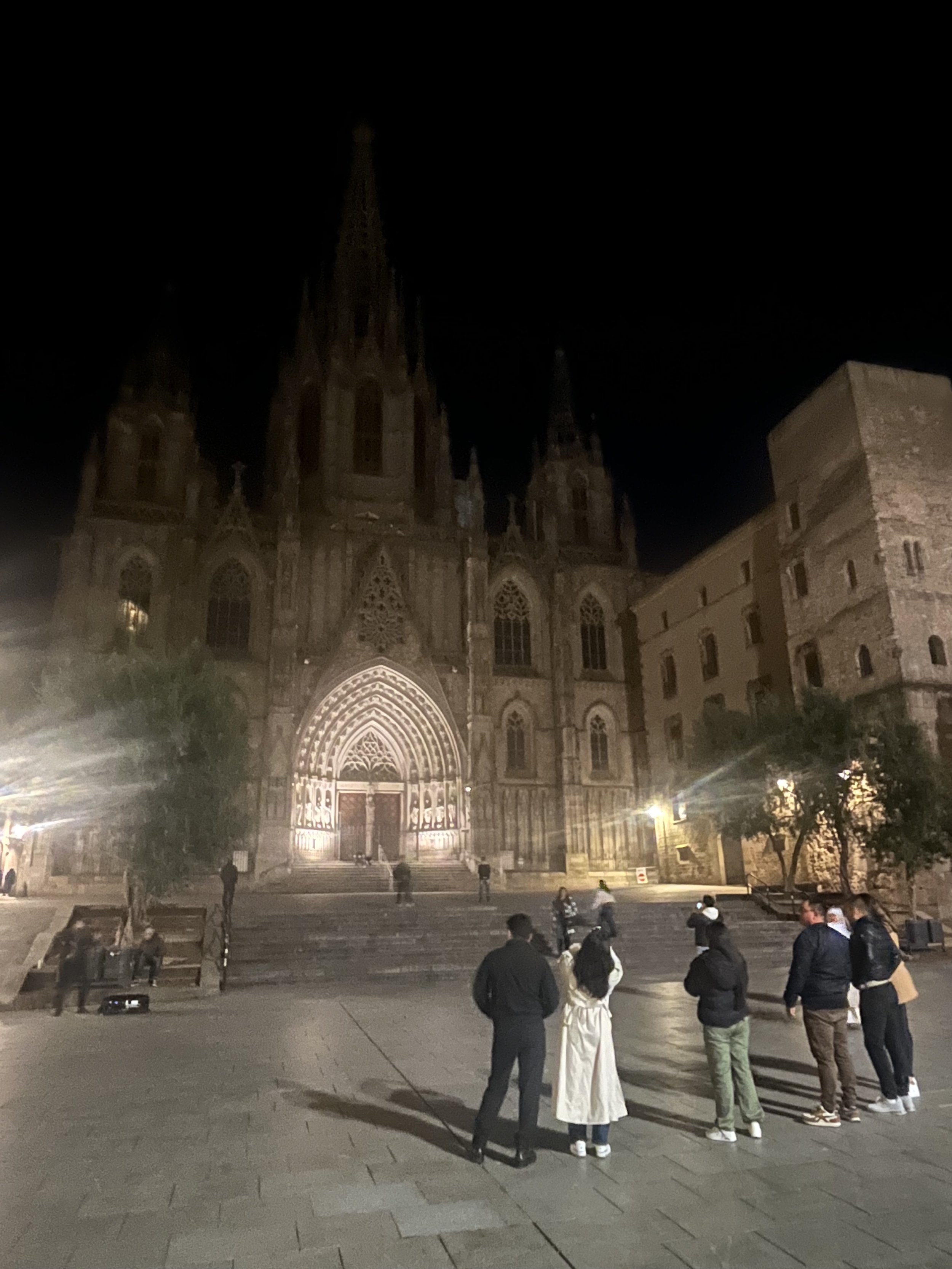
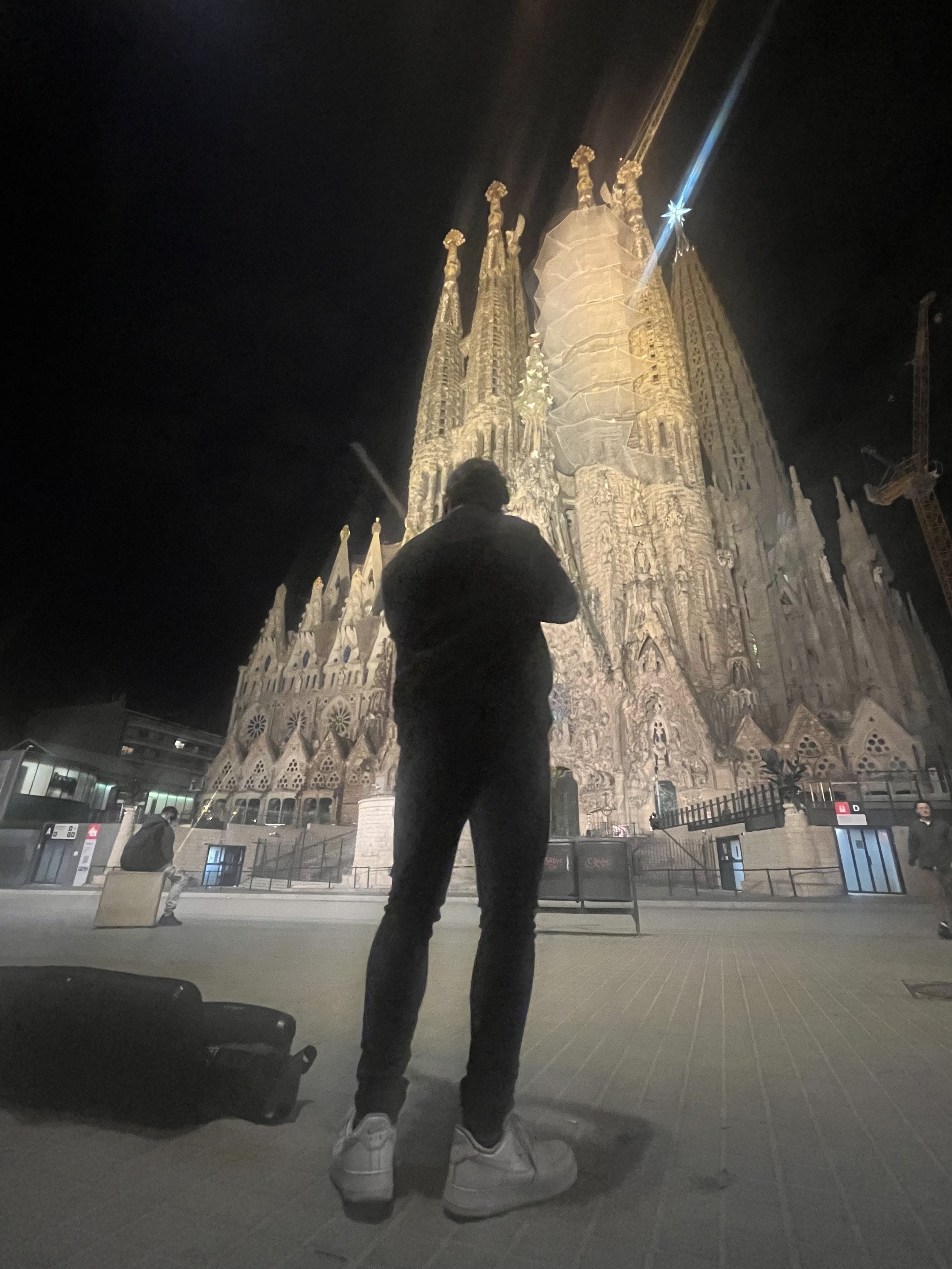
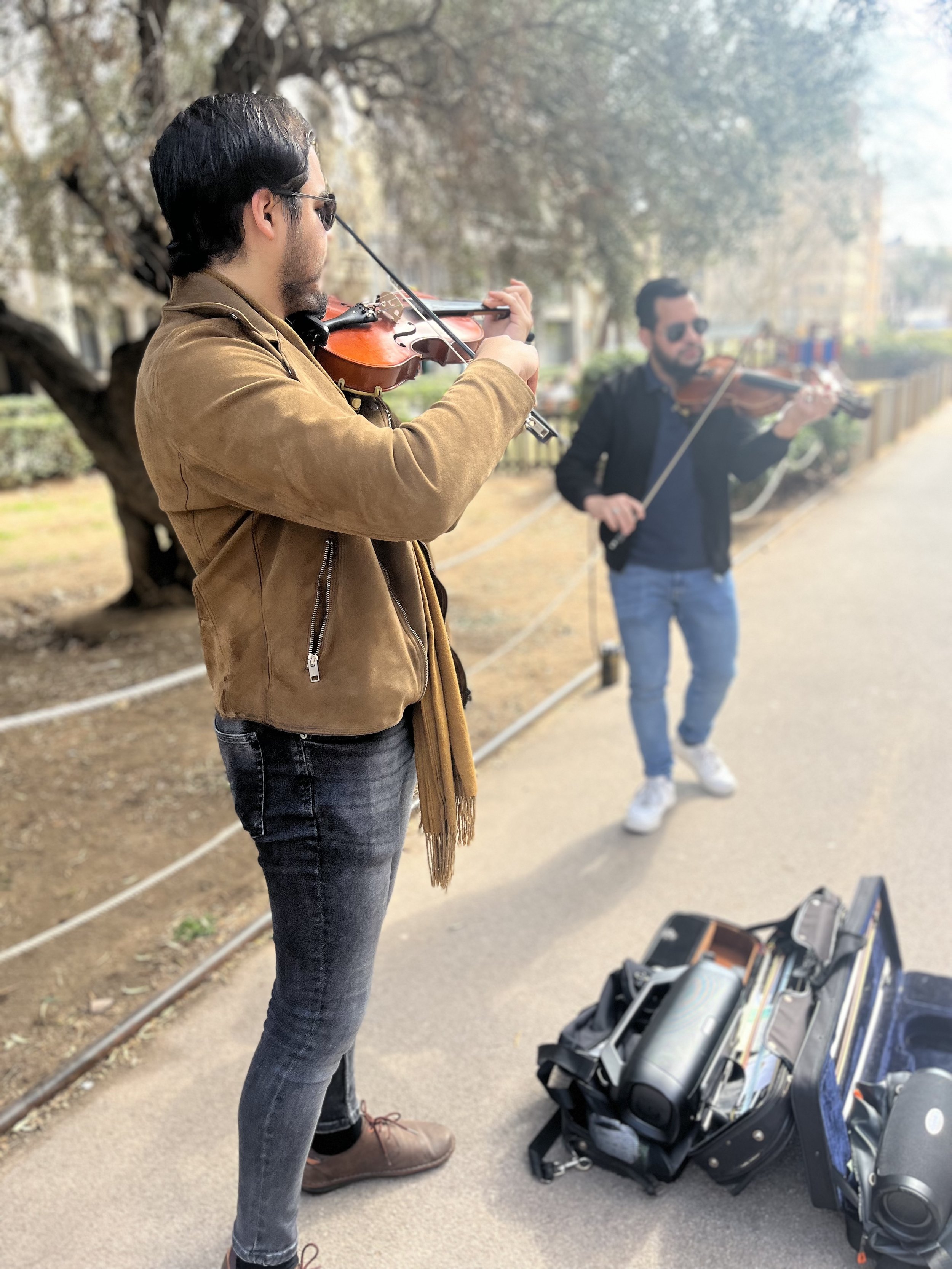
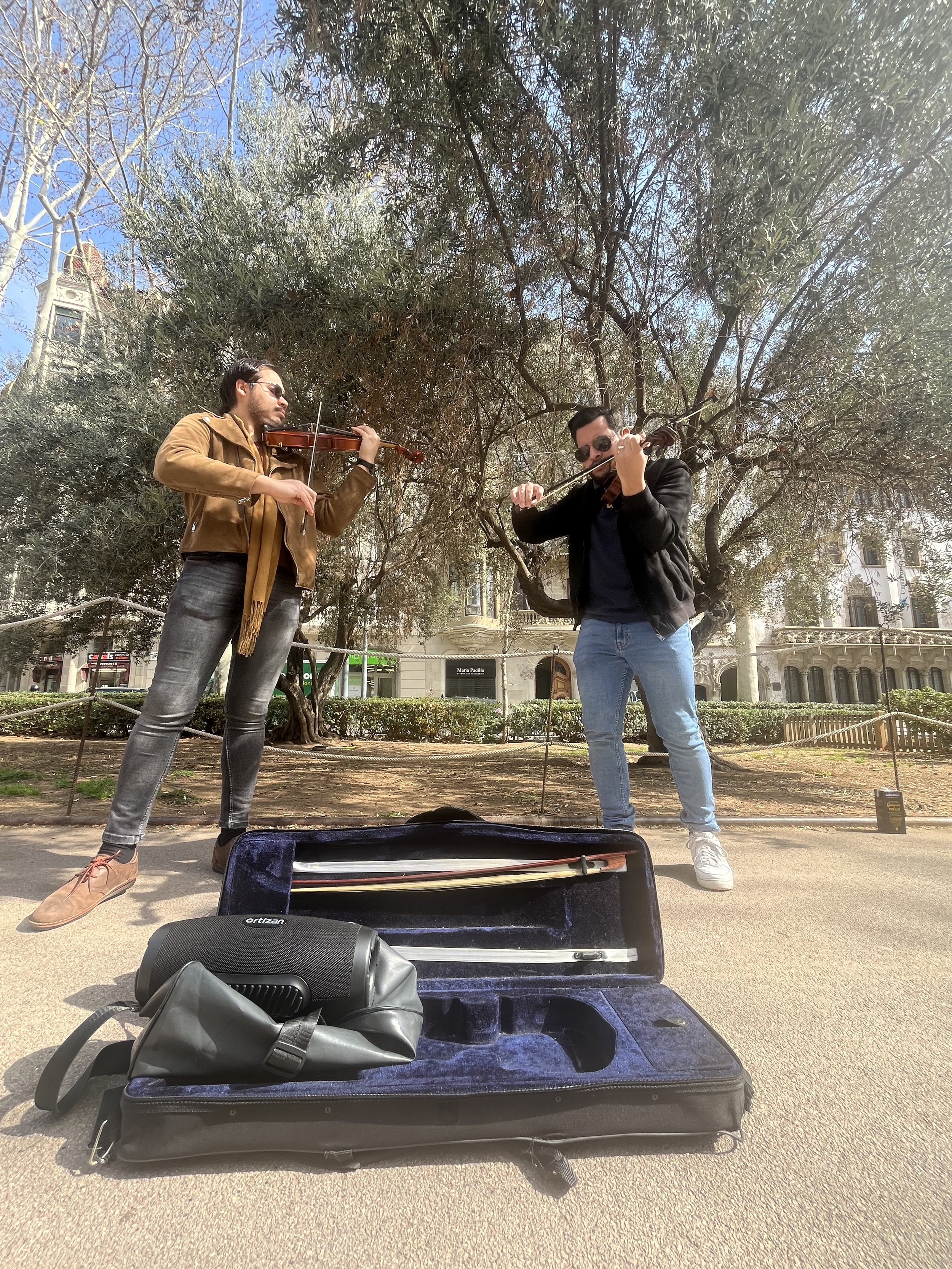
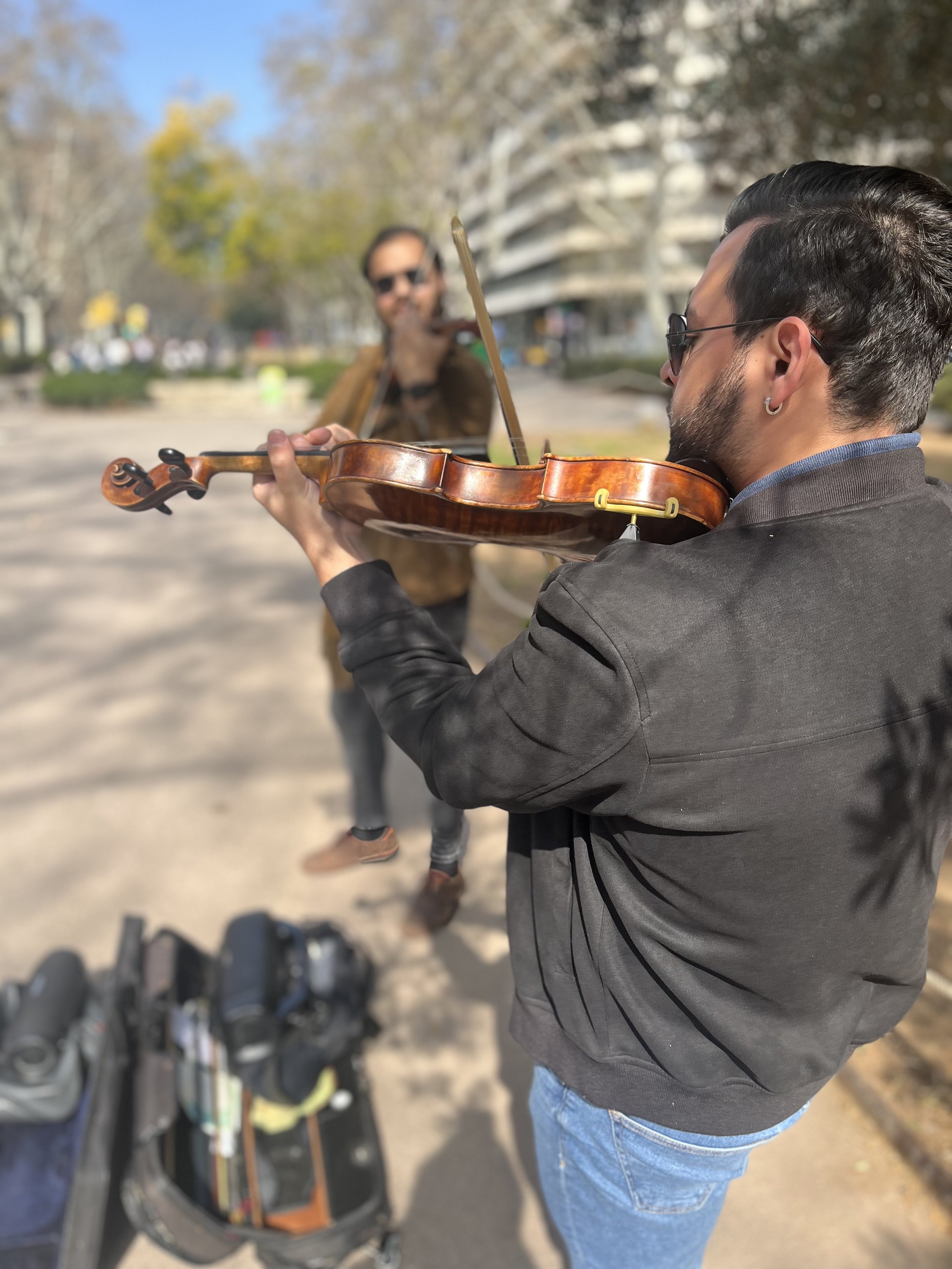
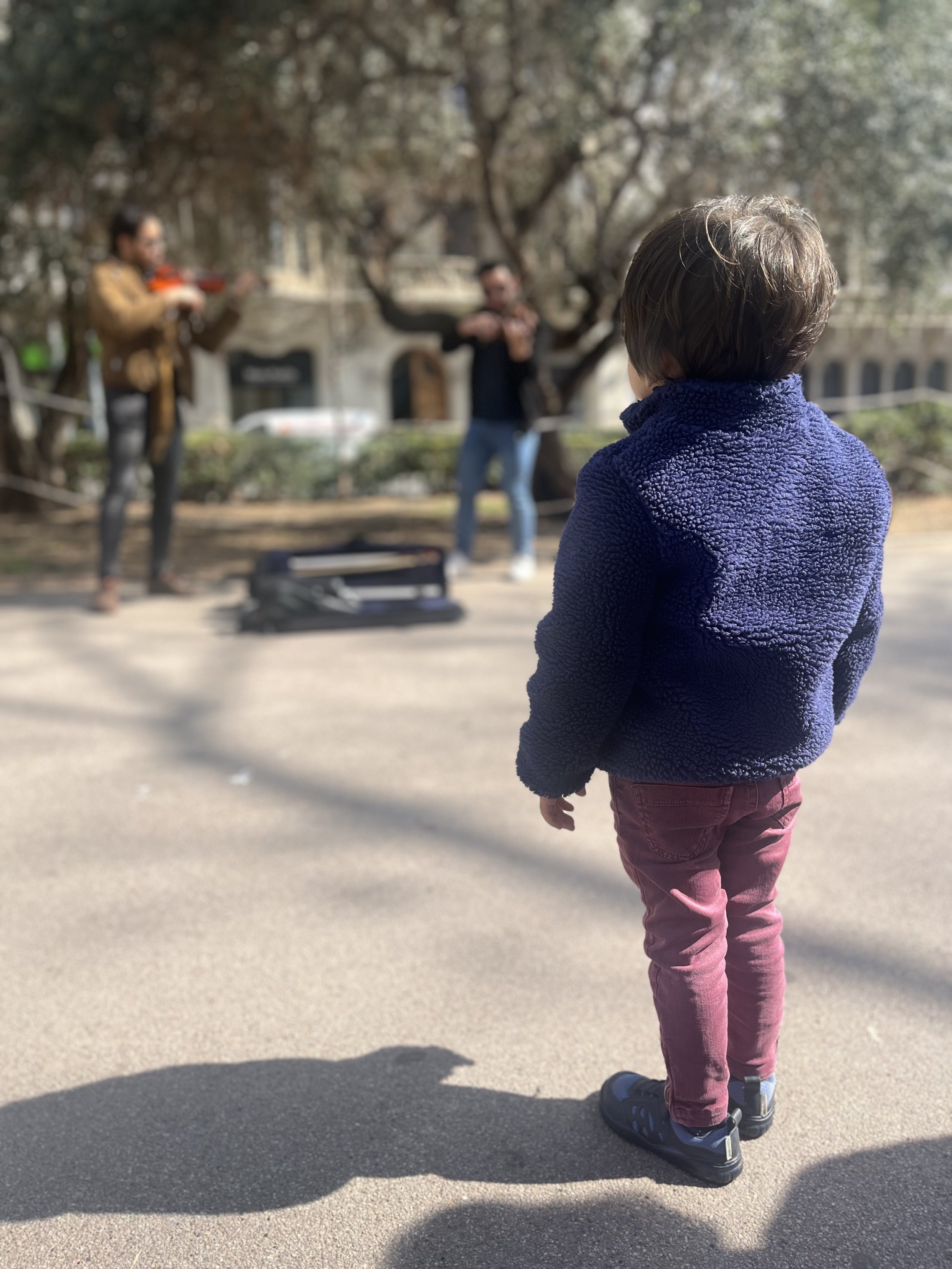
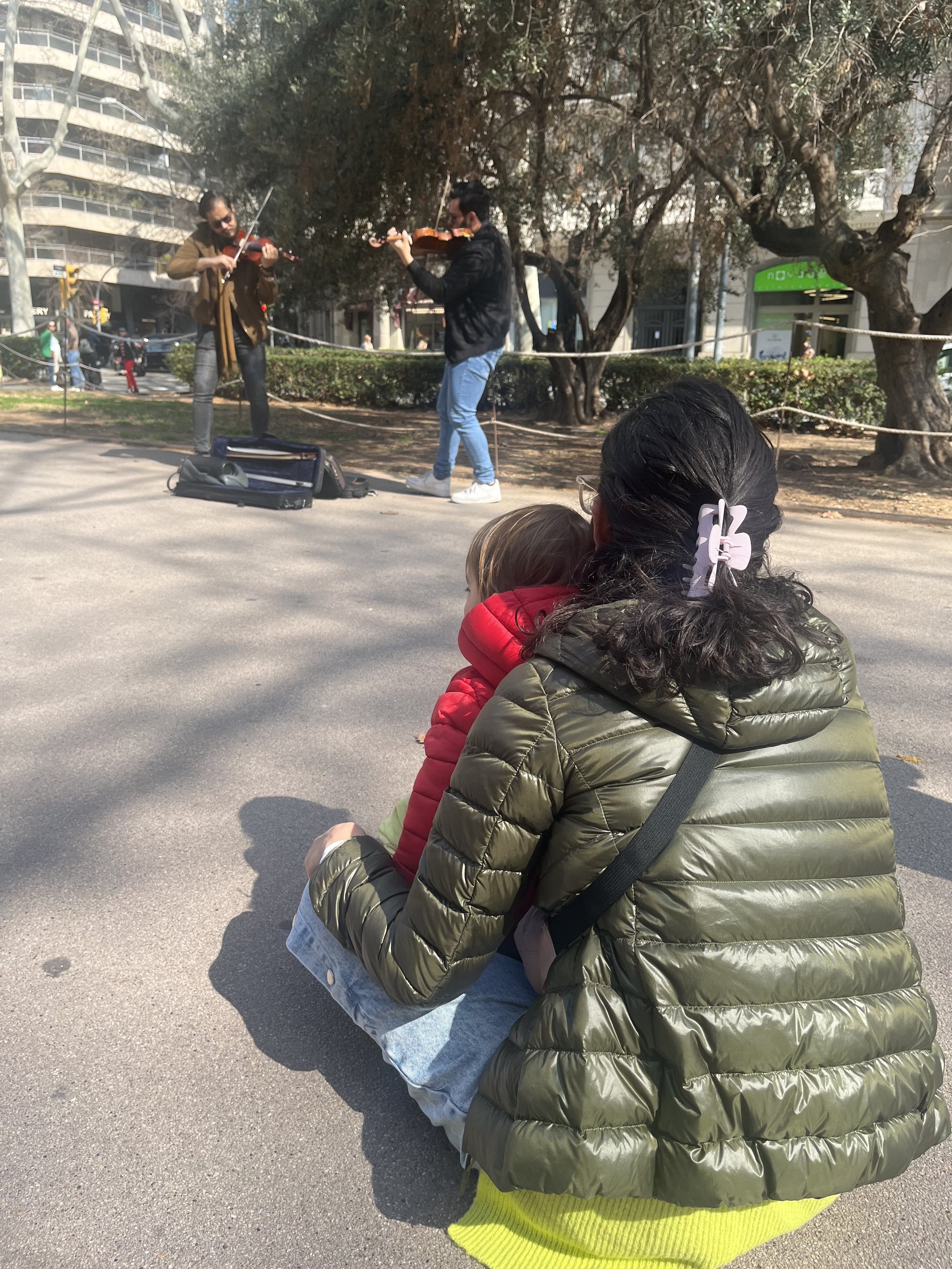
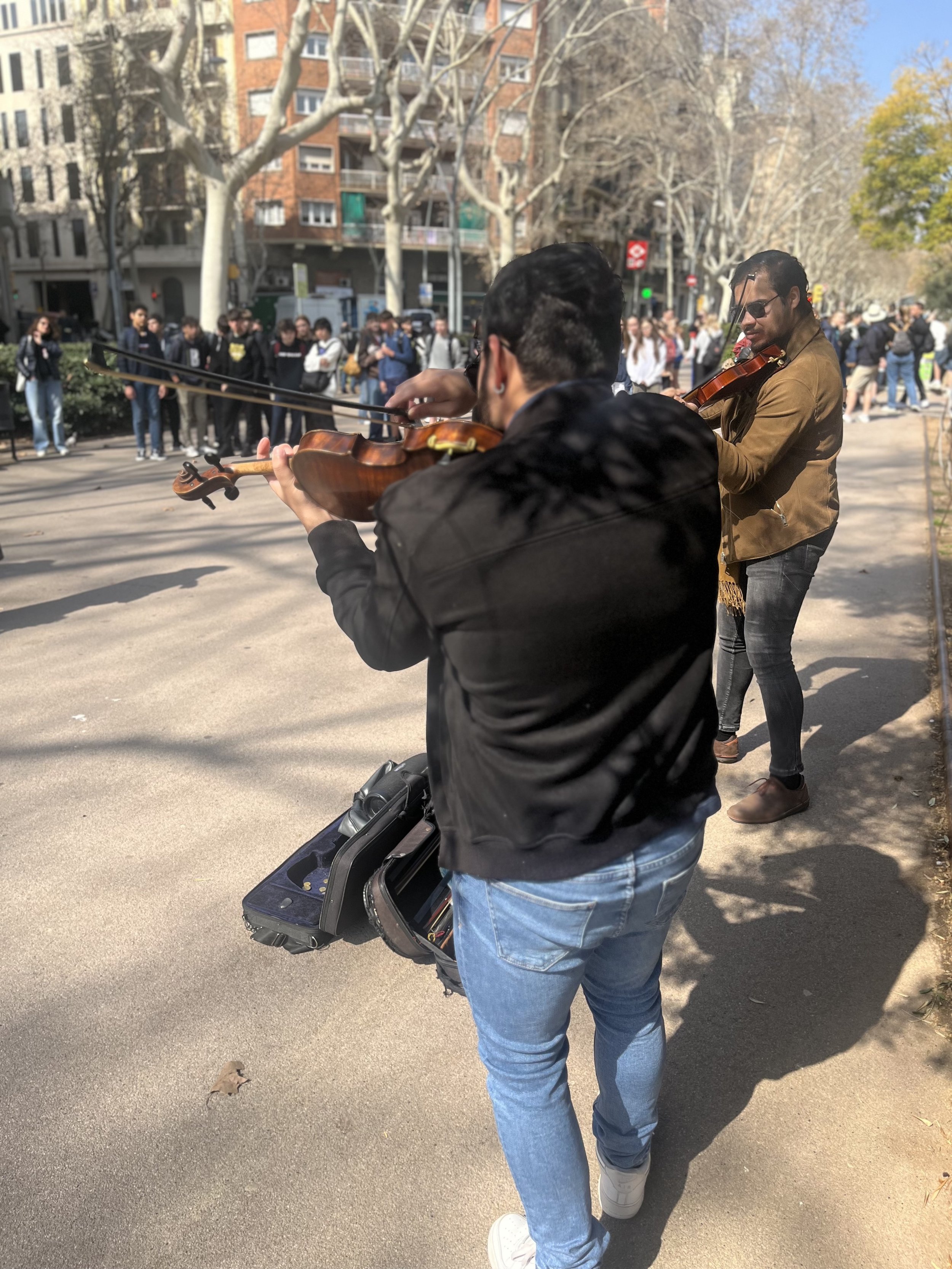
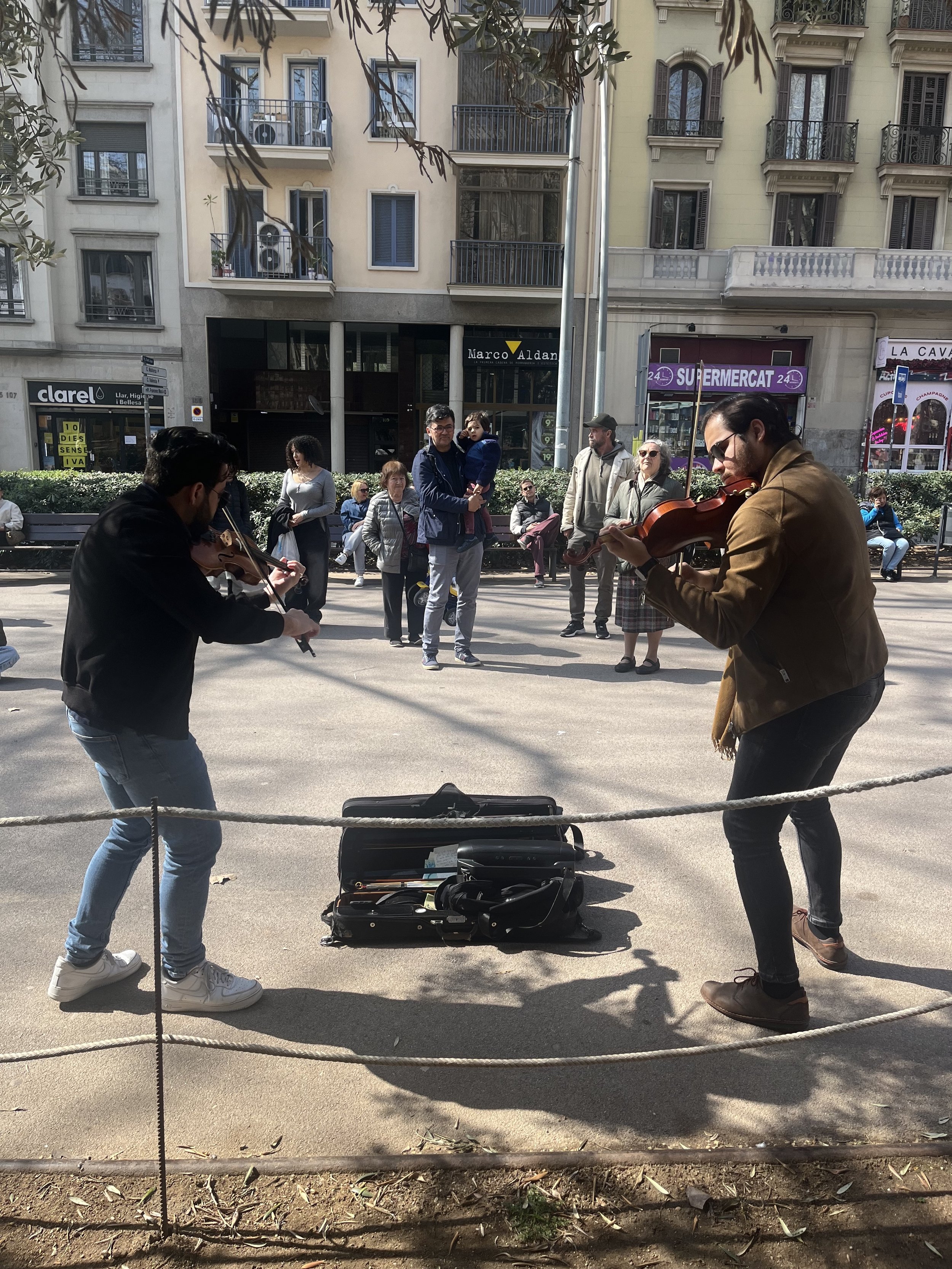
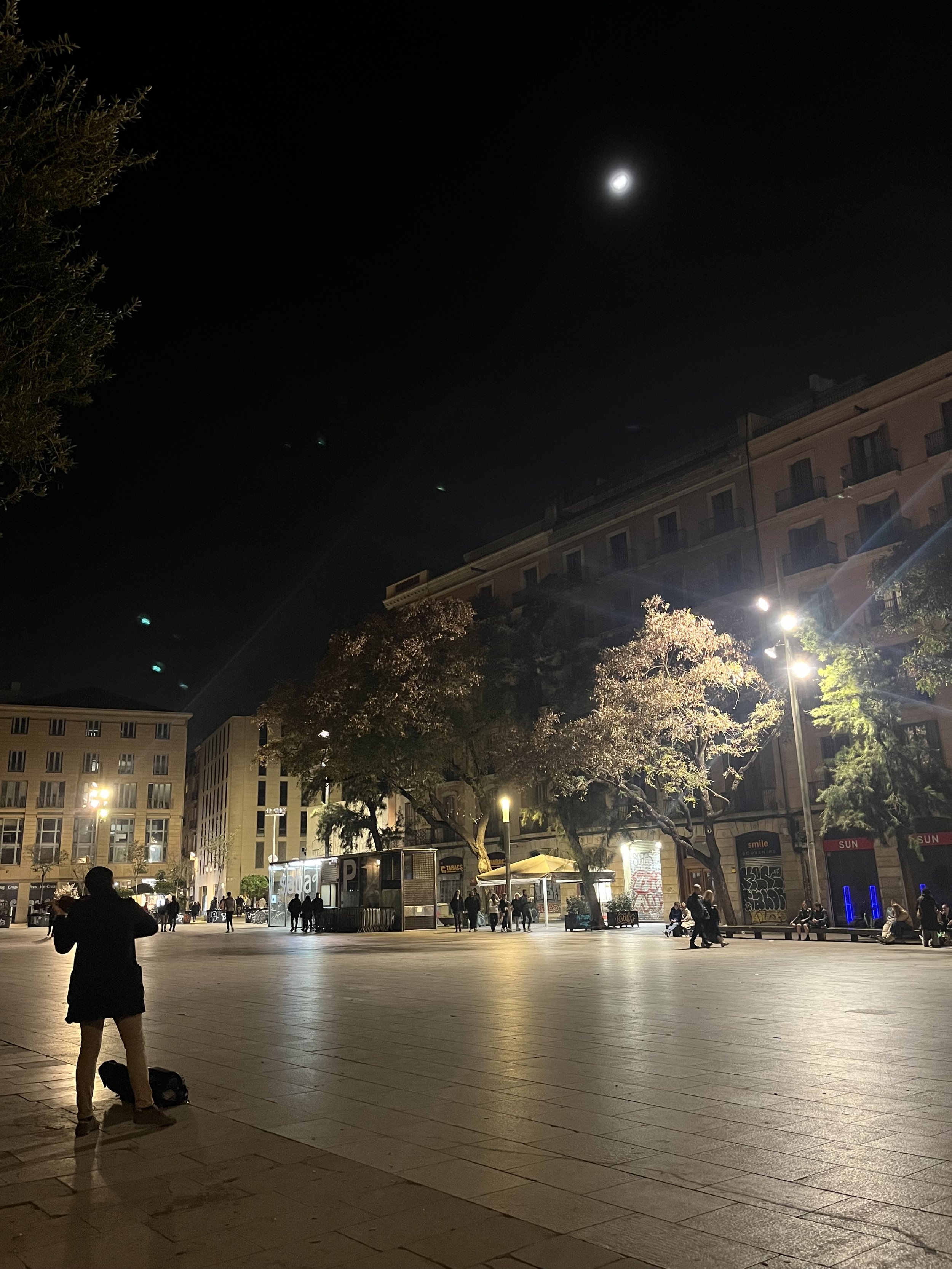
Carlos Zuniga
Jean Izaguirre
On a Tuesday night in Barcelona, I walk to a bar called Craft Barcelona, where I have played at the open mic a couple times since coming to town. After checking in for tonight’s event, I walk out and wander toward the Cathedral of Barcelona to kill some time before my name comes up. As I approach the massive plaza that fronts the cathedral, the sound of a classical violinist draws me near. After completing the theme to Schindler’s List, the violinist begins playing one of my favorite pieces, Gymnopedie No. 1 by French composer Erik Satie. The rise and fall of the bittersweet melody of its first ten notes are instantly recognizable and always move me. It’s been used in many films including one of my absolute favorites, Man On Wire, the documentary about Philippe Petit’s 1350-foot-high wire walk in 1974 between the two roofs of what used to be the World Trade Center in New York City. In the darkness and quiet of the night, under the glow of the towering cathedral, this lone musician’s performance is mesmerizing. While some pass by on scooters or Glovo delivery bikes or in ear-budded isolation oblivious to the majesty occurring right in front of them, a small group gathers in a semi-circle and applauds after each song. Two hours later as I board the subway at the Jaume I station to come home after the open mic, there he is sitting on the train. The violinist: Carlos Zuniga. Fate. Destiny. On the following night, I wander the one block from my apartment to La Sagrada Familia. There, under Gaudi’s massive still-incomplete stone monument to god on the northeast side of the Basilica, is a solo violinist beginning to serenade both the passersby and the church itself. Carlos had told me to check out his friend, Jean Izaguirre. Each night when the flood lights across the street go on to illuminate the church, Jean hits the crescendo in Tchaikovsky’s theme to Swan Lake when the horns enter with a surge. He times it precisely each night. The drama is real. Separately, these two Honduran master violinists play every night in the shadows of these iconic cathedrals designed to elevate the masses from their earthly struggles to something more heavenly. In fact, without even entering these halls, these same pious worshippers could be moved even more deeply by simply listening to the magic being created on the streets by these two captivating violinists.
I am from Honduras. I was born in 1996. I came to Spain when I was 22 in 2019. I was born in 1996, too, and I am from Honduras as well. We knew each other in Tegucigalpa. I moved here in 2023. We know each other from the National Autonomous University of Honduras. Before that, I studied in the Conservatory and Jean in the National School of Music. Actually, before the University we went to an international musical camp from the Youth Orchestra of America (YOA), and we met in 2012. We were playing violin with the symphonic orchestra. It’s like a master class from teachers from YOA that are from all Americas. They come to our country, and we prepare a concert. Carlos started the University in 2014 and I started in 2015 and that’s when we met again. And we both passed the audition for the University orchestra, and we started working together.
My grandfather was violinist, but not my father. He never played. He loved music but didn’t play. He has a record player, and he has so many classical music discs, and I liked that music. My dad wanted to be an architect, but that degree did not exist at that time. He was born in 1928. He had a business renting apartments. My mother is a tailor. At the beginning, my father supported me because his father was a musician. My mother preferred that I will be a doctor! And one of my sisters is a professional pianist. She has a popular band and teaches in the Conservatory where I studied.
I started to play in the school when I was 7 years. I started playing the piano. Then, I entered in the Conservatory at 11 years old and started with the bassoon, but only for one week. My father put pressure on me to change my instrument. He wanted that I play the violin. I go to Conservatory in the morning at 7am and then regular school after that. Initially, when I started playing the violin, I didn’t enjoy. I don’t think anybody enjoys it at the first time. Violin is too hard. It’s like the pain of love! When I start my 4th year at Conservatory, when I hear the things I play that I like, this is the point when I start to love the violin. You can enjoy the music when you hear the Chicago Symphony Orchestra, but it is difficult to make a good sound. But I never thought to quit. I still had the commitment. When I found the inspiration in one performance, like Hillary Hahn or Maxim Vengerov, it kept me going.
My dad always used to tell a story about a great-great aunt who was a pianist, but I think it’s bullshit because I never saw a picture or anything, but my dad is a painter. My mom is a lawyer. She doesn’t know anything about music, but she told me when she was pregnant, she used to play classical music every day for an hour or two hours. My dad always made me listen to classical music, but when I started playing music, he told me to change my career even though he was an artist as well! He knew it was going to be difficult. So, at the beginning my father did not support me being a musician, but my mom always. When my dad saw I could actually make a living out of it, he supported me. I started with piano, too, but I didn’t like piano. That was when I was 8. When I turned 11, my mom saw I was fascinated by music, and she took me to the National School of Music. I did the audition, I passed and that’s when I started learning how to play violin.
We never played on the street in Honduras. It’s dangerous. People would take the money or the instrument. Maybe not so dangerous, but we have that culture of fear. You are not going to go to the street with an expensive instrument. That would be nuts!
If you want to be a musician in Honduras, you either have to go to the Conservatory or the National School of Music, and then if you want a professional violinist career, you have to go to the University. There is only one university where you can get the best training. My plans were finishing my bachelor’s and probably go to the United States or Europe to make a master’s and then a PhD, but things sometimes don’t go as you plan.
In the University, first I think about getting the diploma to finish the studies. Then, I think about getting a master’s and PhD. I wanted to play violin in a symphony or make a quartet or do private events. The symphony is not the only way. We studied with masters from Houston and Moscow. Very high level.
You need these degrees like a requirement. In the world of music, if you are a very good violinist, to work in an orchestra you need a higher degree. Like everyone, I was planning to play with a symphonic orchestra. Honduras didn’t have a national orchestra for 20 years. It just started last year again. There were some orchestras, but we have basically only one orchestra for some years, the Chamber Orchestra of the University. That’s the only one when you can get a decent salary. I played for them while I was in school. We were studying and working at the same time. For us, we earned maybe 450 dollars a month, very low, and we compliment that with playing at weddings and events.
We know all the professional classical musicians in Honduras. There are no more than 100. The good musicians maybe only 20. Many of our friends in the University don’t do music because it is so difficult. You either work full-time with an orchestra – there are very few – or you work at restaurants and events. Very few people can live from music in Honduras.
I thought of quitting a couple times. I have a love-hate relationship with my instrument. At the beginning, I hate it because it is hard. It is one of the most complex instruments. If you have piano and you play it, it sounds right away. A wind instrument, it could take 5 to 6 months to break through the sound, but a string instrument is hard. But I learn how to love the suffering! I did quit in the pandemic in 2022 because there was no more orchestra or events. It was depressing, so I didn’t play for a whole year, and then I moved here in January, 2023.
I came to Spain in 2019. It’s a long history. In 2018, I met my girlfriend, Joana. But before meeting her, in a mystical way, I had a dream about her. I saw her face without ever knowing her. Then I met her in the University. One month after we met, her sister said she should come to Spain. Joana wanted to leave Honduras, too, and in that moment, Joana’s sister wanted her to come to Spain and without telling her, she bought her an airline ticket. The curious thing is when I dreamt about her, we weren’t in Honduras! At the same time, I was planning to leave Honduras to go to the United States or a country in Europe. Both things mixed, and Joana told me that I am a person who is moved by love. Essentially, if it wasn’t for her, I wouldn’t be here in Spain. She is a classical singer. So, I came to Madrid for two weeks, and here we are now in Barcelona. Joana thought it would be better for the music here, and it’s true. For playing in the street, I think Barcelona is better. If you have a master’s or PhD, maybe Madrid is the better option because there are more orchestras. There are three professional orchestras in Barcelona.
When I graduated from the University, I continued working for the chamber orchestra from the University, and I was studying, but that was until 2020 when the pandemic came, and I started working for a US call center. I was working for Chamberlain, the garage door openers. It’s a job, but it was hell. At least 50 calls every day were like, “I can’t open my garage door.” “Did you push open?” “Yeah, but it doesn’t work.” “Did you make sure that the battery was working?” “Oh, ok. You were right. Thank you very much.” All the day for 2 years. When the orchestra closed, I was actually a QA manager for an insurance company from California.
I actually did quit the violin in the pandemic in 2022 because there was no more orchestra or events. It was depressing, so I didn’t play for a whole year. I didn’t touch my instrument for a whole year I was so depressed. In that year, I figured out that my life would be so miserable working on a desk 8 hours a day, and I said, “Fuck it!” I needed to play again. Actually, working for an American company and living in Honduras was good because the money was good, but money is not everything. I had money, but I was miserable.
I was with my partner, and his mother lives here in Barcelona, so we said, “Why don’t we move to Barcelona?” I was bored of the country. I was miserable there, and I needed music back in my life. So, we decided to come to Barcelona. I started playing again. When I got to Barcelona, Carlos was the one who told me I should play on the street and not get a job. He started giving me ideas of what I could play in the street, and that’s when I started playing again. The change of one country to another was the right moment.
I have never gotten a permit to play on the street. Me, too. There is a huge waitlist. There are over 800 people on the waitlist for the permanent permit. It could take years. And for playing in the night when I play, you can’t play with a permit anyway.
I was nervous the first time I played. The first time I played I played solo with no backing track. When you play in an orchestra, you have a lot of people supporting you, but when you play in the street, you are a soloist. The first time I played was in Manresa, a small town outside the city. It’s more than one hour away. When we moved here, we first moved there. I played on the main walking street there. This is an important thing about my relation with Joana. She motivated me to not quit music. Initially, I came without enough money, and I needed to survive. I need to do something to pay the rent. Joana pushed me to continue with the violin and not get a regular job because I am a musician, and that’s what I should do. Initially I played one hour because that’s about the length of the concert.
Playing in the street is very difficult because you need to play better than in a theater. If you don’t play really good, the people don’t stop to listen. Playing on the street has made me a better player. It forces me to love what I’m doing in order to transmit this to the people. The quality of the sound is more important when you play solo. And it expanded my repertoire. Playing in the street taught me that for people to like the music, I have to like it first. My repertoire is classical even though sometimes people tell me to play more popular songs. Normally when I play the second movement of the violin concerto from Mendelssohn, a very small number of people stop, but that small number that stop is more valuable than hundreds. It’s better quality than quantity.
I play Satie, Schindler’s List theme by John Williams, Vivaldi, Tchaikovsky, Chopin, Rachmaninov. Paganini. I don’t play popular music. I prefer classical music. I take the job of looking for music that has more content than lyrics. But I play popular and classical music. For example, I play I Can’t Help Falling In Love With You by Elvis Presley or Experience by Ludovico Einaudi or the main theme from the Interstellar soundtrack.
When I moved in January, 2023, I was really down and depressed; I broke up with my partner. Carlos said, “I can’t see you like this.” And like Joana for him, Carlos was my Joana. He was my motivation to play here. I started playing on March 17, 2023. The first time I played was in Passeig Sant Joan, and I was definitely shitting my pants! We came from a situation where we always played big auditoriums, big concerts. There was always an audience. I had to change everything I knew to play. It was like standing up on a stage fully naked. You are bearing yourself to the people. But it was life-changing. It made me completely humble because it is me giving my soul to the people. When they listen, they get to judge and say, “Is he good? Is he not good?” So, you have to be humble, and you learn how to deal with rejection a lot. It’s like a hard punch. For example, one of my biggest accomplishments in life was I played with Placido Domingo in 2019 in my country. After playing the first time on the street, I was thinking, “Oh my god, I just played with Placido Domingo in a concert with 15,000 people, and now I’m going to play on the street for people just walking by! I was here before, and I’m here now.” You learn that life changes, and that will make you stronger or weaker. It changed me in a positive way. You learn what people like, what people want. You get to know yourself a lot more. I know when I am not being myself. When I am not doing what I do passionately.
For me it took about one month to feel confident about playing in the street. I have to know how to play with my whole self because now I don’t depend on a salary that the orchestra pays. I have to depend on myself. Now it’s me against the world. Sometimes I look at the people, and sometimes I’m so immersed in my playing that I don’t pay attention. But I play even if there are no people because yes, I’m playing for them, but I’m also playing for me. And sometimes I feel like I am playing for La Sagrada Familia because I sometimes think about the building, “You deserve music.” Sometimes I’m just playing and watching it and admiring it. That connection when I do look at people while I’m playing can be magical. Three months ago at La Sagrada Familia when I was playing, it was very cold. This lady stopped, and I was playing Love Theme from Romeo and Juliet. No one else was around. It was just her, La Sagrada Familia, me, and my violin. She stared at me. I looked at her. I thought, “She’s watching me.” And then when I looked at her again, she was crying. Then, she came to me and crying she told me, “This has been a really beautiful moment. I needed this. I needed something. I was feeling very unloved, and this song made me feel a lot of things. These are the most beautiful moments. I have had similar experiences. People crying. Actually, one guy told me that the music reminded him of his mother. He started to cry, and he was grateful for the music. It was a beautiful moment. When I play a tango, for example I play Por Una Cabeza by Carlos Gardel, there are always people dancing, and I love it when I see that because I know those people are more real than anyone else. They feel the music and want to enjoy the moment. Or when I play Csardas by Monti, the people have so much fun dancing to this also.
I have learned many things playing on the street. It makes me grow as a human being in every way. In my case, when I play, I convert myself into an antenna to transmit the music to the people. It’s a bit strange because the connection is more for the people than for me because when I play, there is a lot of information, content and expression to communicate. And also, a lot of people are watching me, and a lot of things happening all around me. I don’t look at the people very much. When I play, I am immersed in the music, and some people can then follow the music. I connect when I finish playing the piece. If one of them comes to me and says something, this is the moment of the connection for me. I was playing in a wedding one week ago, and nobody listened to the music. In the street I have more people who listen!
I have played almost three years in front of the Cathedral. I start at 9 o’clock and finish at 11. I play almost every night with a backing track. I play mostly every night as well in front of La Sagrada Familia with a backing track, too. I do a dramatic entrance with Swan Lake. I know when the lights go on at La Sagrada Familia every day based on the sunset, and I have it synchronized. I start 52 seconds before the lights go on and hit the momentum of the song when the brass instruments come in right when the lights go on. For example, tonight, I will start at 7:28! It’s very dramatic. The people are always amazed.
Barcelona is a beautiful city but there are some negative things like everywhere. It’s a place with a lot of party people. This isn’t me. Even though there are a lot of beautiful places like the sea, the mountains and the history, it’s not the city I like to live all my life. I was thinking about Madrid, but I don’t know. Life changes. There are more opportunities there for classical players, and the city is cleaner and the taxes are less. It is too difficult to go back to Honduras now. This is a sad point because my family and friends are there and all of my memories. In many cases, the criminals know if you are living abroad and come back, you have money, so it can be more dangerous. They don’t know we just play in the street!
I love Barcelona because I am a party person. I like partying from time to time, and I like that this city is very much alive. I love going to Fiesta de Gracia. I see people enjoying on the street safely and having a good time. I love that you can be sitting outside on the sidewalk having a coffee and having a conversation. There is the beach in the summer. In winter you can go to the forests, the mountains, the snow in the Pyrenees. I’ve been in many cities in Europe, and I would say Barcelona has it all. I can not go back to Honduras.
The future for me musically is I will never quit violin ever, but I’ve been thinking about making my own songs, or making projects that could lead to a more visible presence. I also teach privately. My future is to live from music. I don’t think so much about the future. The life taught me that when I make plans, these plans don’t work. The only thing I can say is I want to live for the music. Music is my life.
At this time, I don’t practice too much because I have to take care of my body. If I practice too much, then when I go to play at the Cathedral, I can have some pain. In Honduras, I practiced maybe 6 or 8 hours every day when I was in the University. Me, too. I once had tendonitis from my shoulder all the way to my hand. I was teaching at a summer camp, and we had a very hard piece to play. I was practicing 10 to 12 hours a day. After two weeks I got the injury, and I had to stop for 6 months. People don’t understand that we are like professional athletes. It is mentally and physically exhausting. I always sweat when I play. Always. We use the Hal Grossman method for stretching and keep our body ready to play. He came to Honduras once and taught us this. Everybody knows this method. Sometimes we have to visit a chiropractor to take care of our body as well. I think about my hands a lot. Me, too. For me, before or after playing, I don’t touch water at all. If it’s too cold after playing, it makes me tense. It could lead to an injury as well. Before or after playing I don’t cook or wash anything.
The only bad experience on the street is when the police come. When it happens, it definitely lowers my spirit. Maybe 4 or 5 times. They sometimes threaten to take my equipment, but in my case, they are usually friendly. Because I play classical music, maybe this is why they are friendly. For the last few years, now they know me, so they don’t bother me now. They stopped me here at La Sagrada Familia a month ago. I was playing Meditation from Thais by the French composer Jules Massenet, and the cops came by. They told me, “You are playing very beautiful, but I have to ask you if you have a permit.” I said, “No, I don’t.” He said, “Has someone ever stopped you before?” I said, “No, never.” They asked me, “Never?” And I said, “No, never.” They said, “How long have you been playing here?” I said, “Six or Seven months.” They asked, “And no one has ever stopped you?” I said, “No, actually when cops pass by, they normally tip me or tell me they like the playing. You are the first one that stopped me.” They said, “Well, unfortunately we have to stop you. You can’t play while we are here.” And there was a lady listening to me, and she got very angry at them and told them, “You should be chasing thieves, not these people that are making art in the street!” She was swearing at them. It was kind of fun. They said, “We’re sorry, but we have to make our job.” If you are a good musician, they let you play. Most are friendly.
Since I wanted to be here legally, I made the paperwork in order to come and study. I was studying event planning for about a year. That’s over now. So now I met someone, and we are partners, and I’m waiting for the resolution for my citizenship. We’re in love!!
I’m trying to legalize my situation because I’ve lived here for more than three years and can support myself. I need to prove to the government that I am capable of supporting myself. I do other things like private events, and I teach violin, too.
How much money I make when I play at La Sagrada Familia depends on the season. In winter, it goes very low – around 50 Euros per night. Around 1500 per month. In summer, I make more than 100 Euros each day. This is not true for all street musicians. It depends on the quality of the playing. Last night I made 115 Euros. Being single and no responsibilities, we can live ok. Transportation is super cheap. Medical is cheap. Food isn’t so expensive. I pay 500 Euros each month for my room with a bathroom, but I could pay less without my own bathroom.
Right now, sometimes I think about quitting playing on the street. I see myself in the future and I think, “Am I going to be able to do this exact thing for a long time.” Long term, it is exhausting. When you play with an orchestra, you are sitting and following the directions of the conductor. On the street, we prefer playing while we’re standing because the flow is better instead of being seated. Also, the emotional and mental effort is bigger. Playing in an orchestra is ten times easier now than playing on the street. Imagine that when you play as a soloist in the street, it’s like giving a concert every single day! But there is another side of the coin. When you play alone, you have to make your playing sound like an orchestra by yourself. It is more difficult to return to an orchestra now because when your sound is a more solo sound, your sound is too big. It doesn’t fit. For example, last year we played at Palau de la Música and Carlos’ sound was way bigger than all the other violinists’ sounds. It was appropriate because I was the concert master, and I had a solo, but my sound was much bigger playing with the other violinists. I wasn’t prepared for how big my sound was. It’s all because of my playing in the street. And in an orchestra, you have to recognize the dynamics. And when I play as a soloist in the streets, I do it my way. I would love to be a soloist in an orchestra, but this is very very difficult. I prefer playing solo now. For example, I was playing at a wedding three weeks ago. I was playing with a track, and I started playing before the people came, and I asked one of the assistants, “Do I sound too much?” And she told me, “You sound more than the speaker!” I was like, “Holy shit. That’s too big.” It’s better because my sound projection grows from playing on the street. There are some people from the buildings near La Sagrada Familia who come down and say, “I was listening to you in my apartment.” I was shocked. I would give advice to every single musician: play in the street because you learn a lot and improve a lot.